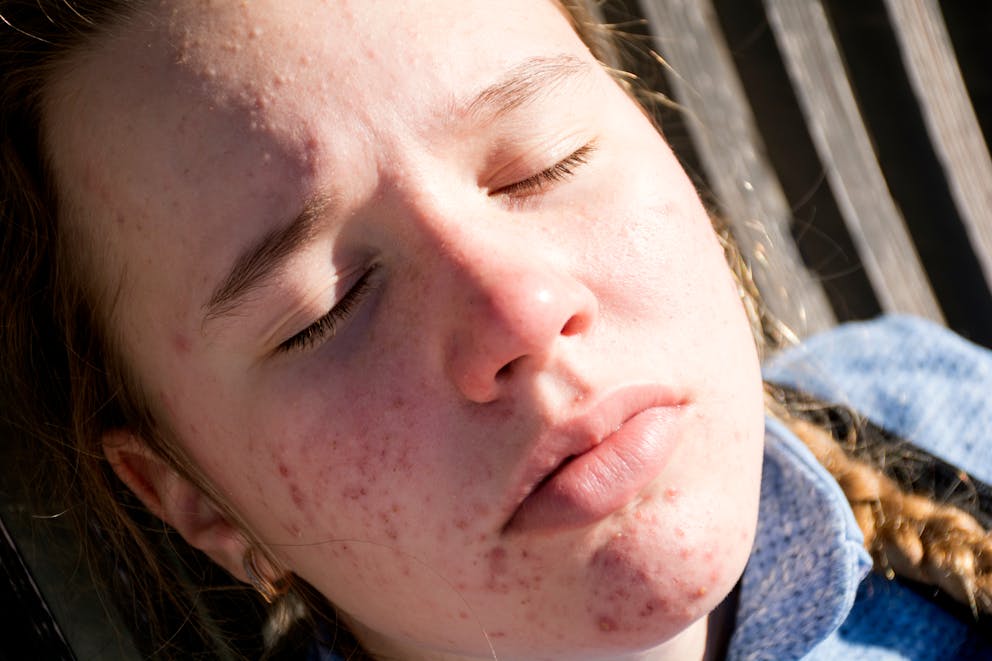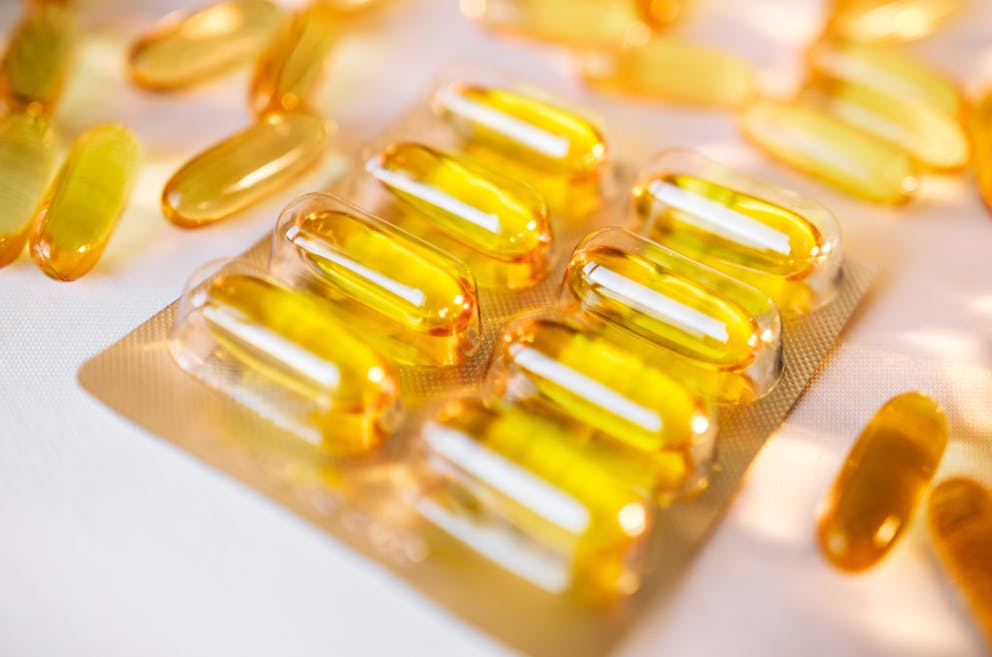Does Vitamin D Help with Acne?
Increasingly more evidence suggests that inadequate vitamin D levels can significantly worsen acne symptoms.
Vitamin D, the sunshine vitamin, is produced when the skin is exposed to ultraviolet B (UVB) radiation from sunlight. However, vitamin D deficiency is common and affects more than 40 percent of the U.S. population.
Discover the link between vitamin D and skin health and learn how vitamin D supplements can help you to fight acne.

What is acne?
Acne vulgaris is a common skin condition characterized by irritated and inflamed hair follicles, skin eruptions, painful pimples, blackheads, and pus-filled cysts. Acne usually develops on facial skin but can also affect the shoulders, back, and chest skin.
Ance is typically caused by a combination of bacterial skin infection, excessive sebum production, and changes in sex hormone levels, explaining why acne typically develops during puberty.
Every hair follicle contains a sebaceous gland that produces oil-containing sebum to lubricate and nourish the skin. These glands are sensitive to hormonal changes, which can trigger increased oil production, leading to clogged and irritated skin pores that trap oil and dirt and are prone to bacterial infections.
Conventional acne treatment generally consists of topical vitamin A applications and antibiotic creams. However, more persistent and severe acne cases may require hormonal treatment and corticosteroid medication.
Watch the video below to learn how vitamin D supplementation can help clear up your acne.
Can vitamin D help with acne?
Vitamin D is produced in the skin in response to sun exposure. This fat-soluble vitamin plays a vital role in bone health, is essential for immune system function, and may lower the risk of colon, prostate, and skin cancer.
Research suggests that low vitamin D levels can worsen acne severity and that vitamin D deficiency significantly increases the risk of skin diseases, including atopic dermatitis, nodulocystic acne, and hormonal cystic acne.
Although more research is needed to investigate the link between vitamin D and acne, it appears that vitamin D’s immune regulatory function, anti-inflammatory effects, and antimicrobial properties can protect the skin from bacterial overgrowth and the development of acne.

Three benefits of vitamin D for acne
A recent study found that vitamin D deficiency greatly increases the risk of developing acne and that vitamin D supplementation significantly improved symptoms in acne vulgaris patients.
Here are three potential benefits of vitamin D for acne.
1. Antimicrobial
Acne can develop due to Propionibacterium acnes (P. acnes) infection. Although this bacterial strain is naturally found on human skin, a lack of adequate microbial defenses can result in bacterial overgrowth, leading to infection, inflammation, and skin eruptions.
Vitamin D stimulates the production of antimicrobial peptides in skin cells that inhibit the growth and proliferation of bacteria, including P. acnes, and support a healthy dermal microflora linked to a reduced risk of acne.
2. Anti-inflammatory
Vitamin D has potent anti-inflammatory properties that help to reduce irritation, swelling, and inflammation of infected sebaceous glands.
Some evidence suggests that vitamin D3 can be absorbed via the skin and that topical vitamin D cream might be a beneficial tool for managing acne.
3. Regulates sebum
Excessive sebum production by hyperactive sebaceous glands contributes to various skin diseases, including acne.
Vitamin D directly modulates the activity of sebaceous glands, inhibits their proliferation, and lowers sebum production, which decreases clogged pores and reduces the potential for bacterial infection linked to acne breakouts.

The best ways to increase vitamin D
Vitamin D is produced when sunlight radiation hits the skin. However, lack of adequate sunlight exposure, darker skin tone, geographical location, and steroid medication can impact vitamin D production and are risk factors for vitamin D deficiency.
While vitamin D can be found in some foods, including mushrooms, organ meats, egg yolks, and fatty fish, these food sources typically only contain small amounts of vitamin D, and it’s unlikely that you will get enough vitamin D from dietary sources alone.
Taking oral vitamin D3 supplements is a convenient and effective way to support optimal vitamin D status.
General intake guidelines recommend an intake of 600 IU of vitamin D daily. However, you may require a significantly higher dosage if you are vitamin D deficient or have little sunshine exposure.
Because vitamin D is fat-soluble and accumulates in the body, too much vitamin D can have adverse health effects and increases the risk of hypercalcemia and kidney disease. Regular blood tests help to determine your vitamin D status and can guide your optimal vitamin D dosage.

Key takeaways
Vitamin D has several benefits for skin health, and vitamin D deficiency appears to significantly increase the risk of developing acne.
Healthy vitamin D levels promote normal sebum production, protect from bacterial overgrowth, and have potent anti-inflammatory effects.
Vitamin D supplementation is an effective and easy way to maintain optimal vitamin D levels and may be a potent therapeutic tool in preventing acne development and reducing acne symptoms.
FAQ
1. Can vitamin D help with my acne?
Research suggests that healthy vitamin D levels reduce the risk of developing acne. And, what’s more, a recent case-control study combined with a randomized controlled trial reported that vitamin D supplementation significantly improved acne symptoms in individuals with vitamin D deficiency.
2. Why does vitamin D affect acne?
Vitamin D has potent antimicrobial and anti-inflammatory properties that protect the skin from bacterial infection and dampens inflammation linked to acne vulgaris.
In addition, vitamin D helps to regulate sebum production, lowering the risk of irritated and clogged pores which can quickly become infected, leading to skin breakouts and acne lesions.
3. Is vitamin D good for your skin?
Yes, vitamin D plays an essential role in skin health. Vitamin D protects the skin from microbial infection, promotes normal sebum production, and dampens inflammation.
Research found that vitamin D deficiency significantly increases the risk of developing skin conditions, including atopic dermatitis and acne.
4. What is the best source of vitamin D for acne?
While sunlight exposure stimulates vitamin D production, prolonged sunbathing can cause skin damage that may worsen acne.
Taking vitamin D3 supplements is an easy and highly effective way to maintain healthy vitamin D status. There also is evidence that vitamin D can be absorbed via the skin, and research is currently investigating if topical vitamin D applications are beneficial for acne management.
5. Does vitamin D help hormonal acne?
Yes, vitamin D can reduce symptoms of hormonal acne. Vitamin D’s potent anti-inflammatory effects can help dampen irritated and inflamed acne lesions, and its antimicrobial properties lower the risk of bacterial overgrowth-linked breakouts.
6. Can vitamin D deficiency cause breakouts?
Research suggests that vitamin D deficiency increases the risk of developing acne. In addition, vitamin D levels correlate with the severity of acne symptoms, meaning that individuals with very low vitamin D status typically experience severe symptoms, including inflamed sebaceous glands, pustules, cysts, and acne lesions.
7. Which vitamins help with acne?
Several vitamins may be beneficial for managing acne symptoms. Vitamins D, E, and A are fat-soluble vitamins that support skin health, regulate inflammation, and promote strong defenses against bacterial skin infections linked to acne vulgaris.
Although zinc isn’t a vitamin, this essential mineral plays a vital role in wound healing and can reduce the severity of acne lesions.
Previous blog
From Complete Diabetes Burnout to Amazing HealthNext blog
What Really Causes Sleep ApneaTags

Popular
08/21/2024
55.7K views
02/23/2025
46.8K views
11/18/2024
281.1K views
03/18/2024
11/21/2022




